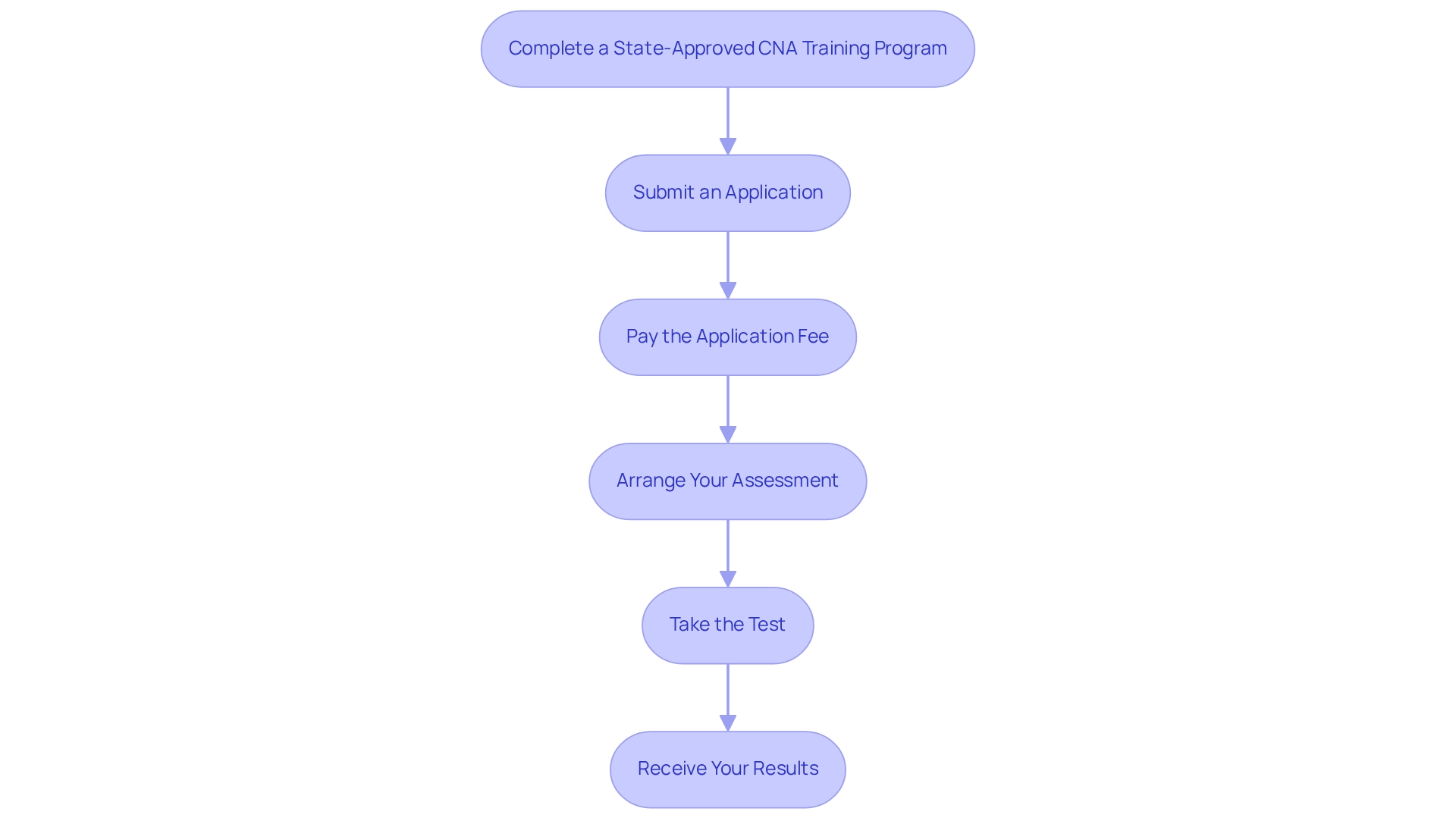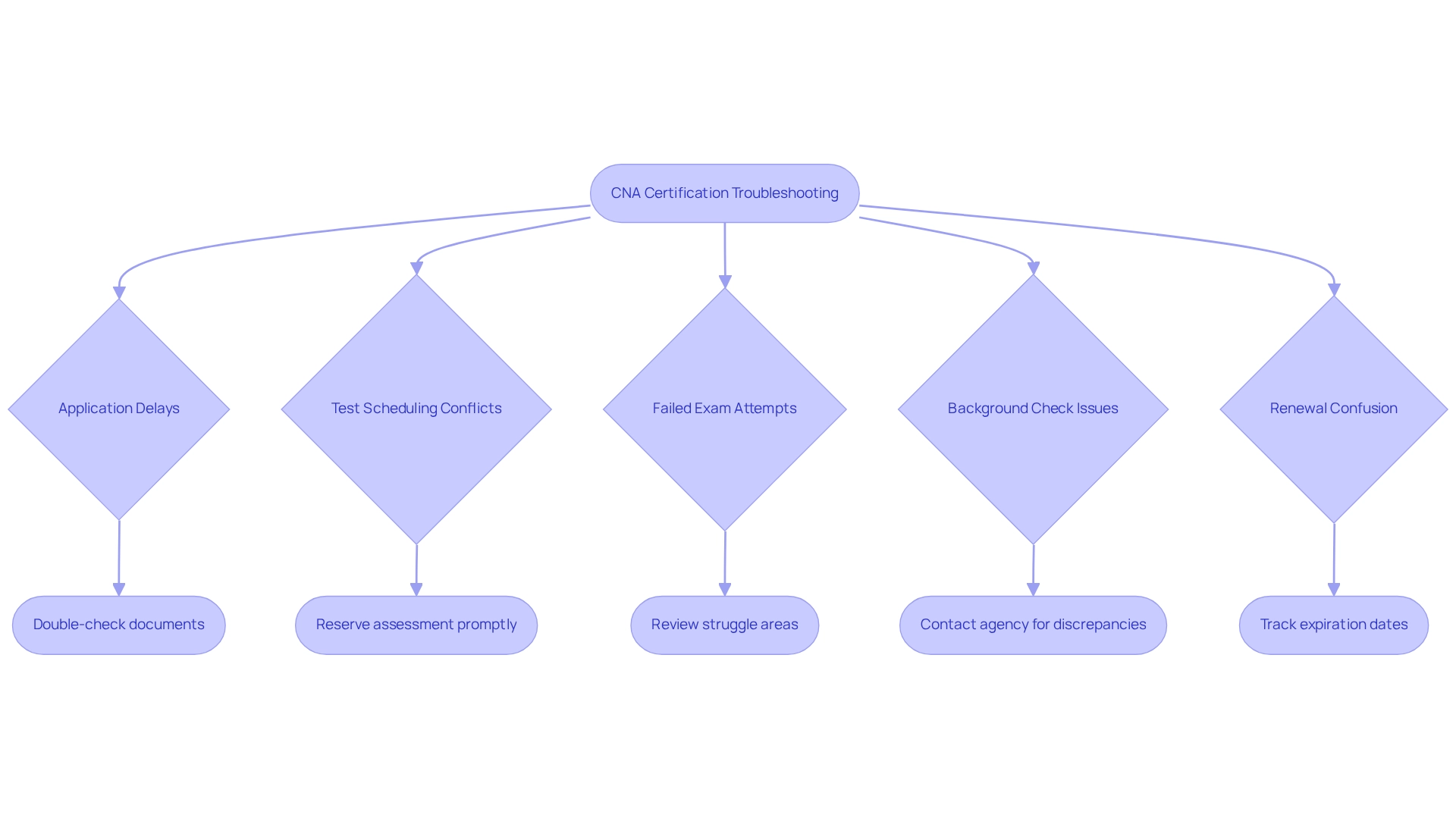Overview
Navigating the Certified Nursing Assistant (CNA) Registry in Florida can feel overwhelming, but understanding the process is essential for your journey towards certification. This article outlines the necessary steps and highlights the importance of meeting eligibility criteria, ensuring you feel supported every step of the way.
As you embark on this path, it’s crucial to grasp the application process, including the required documentation and training. Knowing what to expect can ease your concerns and empower you to successfully achieve your certification. Remember, your dedication to becoming a CNA is not just about meeting requirements; it’s about making a meaningful contribution to healthcare in our state.
We understand that this journey can bring up many emotions, and we’re here for you. By taking the time to familiarize yourself with these steps, you’re not only preparing for certification but also positioning yourself to provide compassionate care to those in need. You have the potential to make a real difference in the lives of others, and that is something to be proud of.
In conclusion, as you navigate the CNA certification process, know that you are not alone. We encourage you to reach out for support, ask questions, and take each step with confidence. Your commitment to this profession is commendable, and we believe in your ability to succeed.
Introduction
In the vibrant landscape of Florida’s healthcare system, the role of Certified Nursing Assistants (CNAs) is pivotal, yet often misunderstood. We understand that navigating this path can feel overwhelming. The CNA Registry not only safeguards public health by ensuring that only qualified individuals provide care but also streamlines the hiring process for healthcare facilities seeking dependable caregivers.
As the demand for compassionate professionals grows, it’s essential to grasp the intricacies of CNA certification—from eligibility requirements to the application process. This knowledge empowers those aspiring to make a difference in the lives of patients.
In this article, we will explore the critical steps and common challenges faced by prospective CNAs, equipping you with the understanding needed to navigate your certification journey successfully. Remember, we’re here for you every step of the way.
Understand the Purpose of the CNA Registry in Florida
The certified nursing assistant registry Florida serves as an official database that lists all certified nursing assistants qualified to practice in the state. Its primary purpose is to ensure that CNAs meet the required qualifications and comply with the standards established by the Board of Nursing in the state, which are essential for inclusion in the certified nursing assistant registry Florida. The certified nursing assistant registry Florida not only safeguards the public by verifying the credentials of CNAs but also streamlines the hiring process for healthcare facilities. For instance, Best Care Nurses Registry is currently seeking caregivers for immediate hire in Hollywood, FL.
To engage with Best Care Nurses Registry, applicants must submit specific documents, including:
- A driver’s license or government-issued ID
- Social Security card
- Proof of citizenship or work authorization
- CPR card
- Relevant credentials
- A recent health physical
By being listed on the certified nursing assistant registry Florida, CNAs demonstrate their commitment to providing safe and effective care, which is essential in maintaining the trust of patients and their families. Additionally, Best Care Nurses Registry offers competitive pay and a fast hiring process, making it an attractive opportunity for caregivers. Understanding this objective is the first step in navigating the validation process effectively, especially for those aiming to provide customized in-home health services for seniors and individuals in the state. We encourage you to apply today to secure your position—your commitment to care is invaluable!
Review Eligibility Requirements for CNA Certification
To qualify for CNA credentials in this state, applicants must satisfy the following criteria:
- Age: You must be at least 18 years old.
- Education: A high school diploma or its equivalent is required.
- Training: Completion of a state-approved CNA training program, which typically includes at least 120 hours of coursework and clinical practice.
- Background Check: Applicants must undergo a criminal background screening.
- Health Requirements: Some programs may require proof of immunizations or a physical examination.
- Disqualification: Being listed on the Department of Health and Human Services Office of Inspector General’s Excluded Individuals and Entities list disqualifies applicants from licensure.
- Felony Waiting Period: For third-degree felonies under section 893.13(6)(a), more than 5 years must have passed since the plea, sentence, and completion of probation.
Ensuring you meet the requirements of the certified nursing assistant registry Florida is crucial before proceeding with the application process.
In 2025, the average age of CNA applicants in the state reflects a diverse demographic, with many individuals looking to enter the healthcare field later in life. This often stems from a heartfelt desire to impact the lives of others. Expert insights emphasize the significance of CNA training, highlighting that it not only equips individuals with essential skills but also fosters a profound sense of fulfillment in providing care. Successful applicants often come from varied backgrounds, showcasing the accessibility of the profession to those committed to helping others.
As Mikhail Shneyder, president and CEO of Nightingale College, states, “Although your educational journey may be difficult at times, you will reap the reward of utmost satisfaction when holding your nursing diploma for the first time—and nothing will ever compare to the fulfillment that improving and saving the lives of others will bring!”
Staying informed about the latest eligibility requirements and statistics is crucial for prospective CNAs. This knowledge ensures you are well-prepared to embark on your rewarding careers in healthcare, where your comfort and the well-being of others are our priorities.

Follow the Step-by-Step Application Process for CNA Certification
To apply for CNA certification in the state, follow these steps:
-
Complete a State-Approved CNA Training Program: First, enroll in and finish a program that meets state requirements. This is an essential step to ensure you are prepared for the responsibilities ahead.
-
Submit an Application: Next, complete the application for the CNA assessment, which can be easily found on the certified nursing assistant registry Florida. This is your pathway to beginning a rewarding career.
-
Pay the Application Fee: Remember to include the required fee with your application. This small investment is a step towards your future.
-
Arrange Your Assessment: Once your application is approved, arrange your assessment through Prometric, the testing vendor. This will prepare you for the next phase of your journey.
-
Take the Test: The assessment consists of a written portion and a skills demonstration. This is your opportunity to showcase your knowledge and abilities.
-
Receive Your Results: After completing the exam, you will receive your results, typically sent to the Florida Board of Nursing within 72 hours. If you pass, you will be added to the certified nursing assistant registry Florida, which marks a significant achievement.
Maintain Your Credentials: Finally, remember to complete any continuing education requirements and renew your credentials as needed. Staying current is vital in the caregiving field.
In addition to the credentialing process, families should take a moment to evaluate if their older relatives need CNA/HHA caregiver assistance. Are they experiencing difficulty with personal hygiene, dressing, cooking, cleaning, or managing medications? These can be signs that support is needed. Furthermore, health concerns such as chronic conditions or recent surgeries that necessitate ongoing care are also critical factors to consider.
Open communication with caregivers and regular check-ins with loved ones can ensure quality care. It’s important to note that CNAs (Certified Nursing Assistants) focus on medical tasks, while HHAs (Home Health Aides) emphasize personal care and daily living activities. Understanding this distinction can help families make informed decisions about the type of care their loved ones may need. Remember, we’re here for you every step of the way.

Troubleshoot Common Issues in the CNA Certification Process
Navigating the CNA certification process can be challenging, and it’s completely normal to encounter a few bumps along the way. Here are some common issues you might face and how to tackle them with confidence.
-
Application Delays: It’s crucial to ensure all your required documents are submitted correctly and on time. Double-checking for completeness before submission can significantly minimize delays. Engaging with practice tests can also help you familiarize yourself with the test structure and types of questions, which is essential for effective preparation.
-
Test Scheduling Conflicts: As soon as you receive approval, make sure to reserve your assessment promptly to avoid any delays. If you find you need to reschedule, do so as soon as possible to keep your timeline on track. Understanding what to expect on assessment day can boost your confidence and concentration, enhancing your chances of success.
-
Failed Exam Attempts: If you don’t pass the exam on your first try, don’t be discouraged. Take the time to review the areas where you struggled and consider utilizing additional study resources or practice tests. Free CNA practice tests can be particularly helpful, allowing you to get accustomed to the question format and practice selecting the correct answers under timed conditions.
-
Background Check Issues: Should there be any discrepancies in your background check, it’s important to contact the appropriate agency to resolve them as quickly as possible. Addressing these concerns promptly can help keep your application on track.
-
Renewal Confusion: Remember to keep track of your credential expiration date, and ensure you complete any required continuing education hours well in advance. This proactive approach will assist you in preventing lapses in your qualification. Creating a well-structured study plan that balances your time between written and clinical skills preparation is essential for success in the certified nursing assistant registry Florida. By being proactive and informed, you can effectively navigate these challenges and stay on track toward achieving your certification. Remember, you’re not alone in this journey; we’re here for you every step of the way.

Conclusion
The journey to becoming a Certified Nursing Assistant (CNA) in Florida is not only rewarding but also filled with challenges. It’s essential to understand the certification process, eligibility requirements, and potential hurdles. The CNA Registry plays a vital role in ensuring that only qualified individuals provide essential care, safeguarding public health and streamlining the hiring process for healthcare facilities.
As you consider this path, it’s important to know that prospective CNAs must meet specific eligibility criteria. This includes:
- Age
- Education
- Completion of a state-approved training program
- Passing a comprehensive examination
Familiarity with these requirements will not only prepare you for the certification process but also enhance your confidence as you embark on this fulfilling career.
Throughout the application process, addressing common challenges proactively is crucial. From application delays to exam scheduling conflicts, staying informed and organized can help you navigate these obstacles effectively. This preparation ensures a smooth transition into the healthcare workforce.
Ultimately, pursuing a career as a CNA opens doors to personal and professional growth. It allows you to make a meaningful impact in the lives of those you care for, reaffirming the essential role of CNAs in Florida’s healthcare landscape. Remember, you are not alone on this journey; support is available, and your commitment to care is what truly matters.
Frequently Asked Questions
What is the purpose of the certified nursing assistant registry in Florida?
The certified nursing assistant registry in Florida serves as an official database that lists all certified nursing assistants qualified to practice in the state. Its primary purpose is to ensure that CNAs meet the required qualifications and comply with the standards established by the Board of Nursing.
How does the certified nursing assistant registry benefit the public and healthcare facilities?
The registry safeguards the public by verifying the credentials of CNAs and streamlines the hiring process for healthcare facilities, making it easier to find qualified caregivers.
What documents are required to apply for a position with Best Care Nurses Registry?
Applicants must submit the following documents: a driver’s license or government-issued ID, Social Security card, proof of citizenship or work authorization, CPR card, relevant credentials, and a recent health physical.
What advantages do CNAs gain by being listed on the certified nursing assistant registry?
Being listed on the registry demonstrates a CNA’s commitment to providing safe and effective care, which is essential for maintaining the trust of patients and their families.
What opportunities does Best Care Nurses Registry offer to caregivers?
Best Care Nurses Registry offers competitive pay and a fast hiring process, making it an attractive opportunity for caregivers looking for immediate employment.
Why is understanding the objective of the certified nursing assistant registry important for applicants?
Understanding the objective is crucial for navigating the validation process effectively, especially for those aiming to provide customized in-home health services for seniors and individuals in the state.










